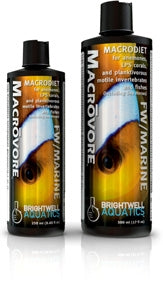Description
Brightwell Aquatics Macrovore
A large percentage of ornamental reef organisms prey extensively upon zooplankton visible to the unaided human eye, and also consume particulate organic material (e.g. "parts") remaining from organisms that have not been wholly consumed by their predators. Rather than rely solely upon pellets and/or flake foods to address these requirements in captivity, the use of natural prey organisms and their parts simplifies the transition into captivity and is an appropriate part of a successful feeding program.
Brightwell Aquatics Macrōvore addresses feeding requirements of motile and sessile organisms that prey upon relatively-large plankton and suspended particulate organic material. The nutritional profile of the specific roe utilized promotes long-term health, growth, and improved (e.g. intensified) coloration in consumers. Macrōvore presents an appropriate range of particle sizes for feeding many species of sea horses, and encourages planktivorous species that are often difficult to acclimate to captivity to begin feeding. The nutritional impact of the roe and marine oils utilized helps decrease overall feeding requirements by delivering greater nutrition per unit dry mass, helping decrease the overall impact of feeding on aquarium water quality.
Macrōvore does not require refrigeration, however storage in a cool, shaded area will prolong the activity of the vitamins. Refrigeration will maximize the shelf-life of Macrōvore.
Instructions and Guidelines
Shake container well prior to use. Turn protein skimmer and other forms of mechanical filtration off prior to adding Macrōvore, and allow 10 - 15 minutes before resuming operation of filtration.
Target Feeding (anemones and corals): First, dilute product with 50% aquarium water in a separate vessel. Target feeding may be carried out with a lengthy piece of rigid air tubing, plastic syringe, pipette, dropper, or similar device; suck a portion of Macrōvore into the feeding device, then slowly discharge the contents of the device 2 - 4" upstream of the target organism(s). Repeat these steps as deemed necessary. Do not place items that have been exposed to aquarium water inside the original container; failure to do so will contaminate the product and encourage it to decompose. See 'Notes' below regarding maximum recommended feeding amount.
Anemones may be fed whenever they appear to be fully-inflated; feeding anemones small amounts on a daily, rather than weekly, basis replicates natural circumstances and promotes health. Most corals extend their tentacles at night, when the majority of coralivorous and zooplanktivorous fishes are asleep and the abundance of zooplankton in the water column passing over and through the reef is at its greatest. Therefore, the most sensible time to feed Macrōvore to corals is after the main lights in the aquarium have been off (preferably for at least one- to two-hours). CoralAminō may be dosed 5 - 10 minutes before feeding to elicit a feeding response and improve the rate of prey capture.
Broadcast Dispersal (primarily for feeding fishes): Feed as desired/required to meet the nutritional needs of fishes and motile invertebrates housed in the system. A sensible starting point is with up to 2.5 ml per 50 US-gallons of water in the entire aquarium system every other day for the first four weeks of use; thereafter, the dosage may be gradually increased if desired. Notes: Macrōvore should be considered a type of food; overfeeding may lead to detrioration of water quality through a build-up of nutrients. Beginning with a low dosage and gradually increasing it with time will allow the biological filtration in the aquarium to gradually adjust and helps avoid the afore-mentioned issue.
Caution: Keep out of reach of children. Not for human consumption
Guaranteed Analysis
Moisture (max) 68.5%, protein (min) 23%, lipid (min) 3.5%, fiber (min) 1.3%, ash (max) 4%.
Ingredients
Purified water, marine crustacean roe, proprietary marine oils, ascorbic acid, free-form amino and fatty acids.

